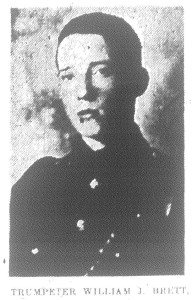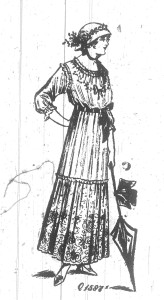
BERWICK ADVERTISER, 20 SEPTEMBER 1918
The Late Lieut Clements
GERMANS ERECT CROSS TO UNKNOWN HERO
We sincerely regret to learn that Mrs Clements, Spa Well Villas, Spittal, has received the sad news that her husband, Lieut. R. C. Clements, N.F., who was previously reported missing, is now reported to have been killed in action. Lieut. Clements joined up early in the war and had considerable service in France as an N.C.O. with the N.F.’s before receiving his commission. He had only been at the Front a few months on the second occasion when he was called to make the supreme sacrifice. Local people will remember what an enthusiast he was in many branches of sport with which he was so prominently connected. The scholars at Spittal Council School (where he served so ably as assistant master) will be sorry to know that he who cared so much for their welfare has had to pay the great price for the liberty they enjoy. We extend to Mrs Clements and her little daughter our deepest sympathy in their most distressing time.
TRIBUTE BY MR BORTHWICK, SPITTAL
Mr T. W. G. Borthwick, headmaster of Spittal Council School, has forwarded us the following particulars regarding Lieut. Clements:-
The news of the death of Mr Robt. Clements, Second Lieut., N.F., was received with regret and sorrow all over the district. In Spittal, especially, where he lived and was so well known, respected and loved, the sad event was the only subject of conversation, evoking universal sympathy for Mrs Clements and her little daughter in their great bereavement. A little more than a month ago Mrs Clements was informed that her husband had been transferred to an Irish Regiment, and later the news came that on August 8th, the first day of the great advance, he was missing.

He had gone out on a scouting expedition accompanied by three of his men and none had returned. As our troops were advancing, the general opinion was that the whole party had been made prisoners. On Friday night, Mrs Clements received letters from the Colonel and two officers who state that when the regiment arrived at the village of Vieux Berguin the bodies of the three men who accompanied Mr Clements were found lying beside a grave in a secluded corner of the village. Over the grave was the inscription “To an unknown Hero.” The officers opened the grave and found the body of Mr Clements. Death, they say, must have been instantaneous as the head was badly shattered by a bullet, but the badges and other tokens showed without doubt that Mr Clements had been buried here by the Germans. The body was reverently re-interred in the little cemetery of Vieux Berguin.
His brother officers speak of him as a brave and fearless soldier, and this is proved by the fact that Mr Clements had penetrated into the German lines much further than anyone expected.
The death of Mr Clements is a very great loss. Goodhearted, generous, cheerful, full of humour and at the same time gentle and sympathetic, no wonder everybody liked him. To the many hundreds of boys who have had the privilege of being his pupils he was more than a teacher. They worshipped the very ground he walked on; waited to escort him home from school at night, and hung around his house door to walk down to school with him in the morning. They clung to him like needles to a magnet. What shall I say of him as a teacher? Mr Clements was a man of great natural ability and his initiative and individuality were great assets.
The whole community in Spittal mourns his loss; many were moved to tears when they heard of his death.
Mr Clements was the oldest of three assistants who have served in this school. The two younger men, Mr Roy Hunter, and Mr John M. Tate, both university graduates and fine men have been killed. They were not so well known as Mr Clements, but their memory is held in loving respect by all who were associated with them.
I had hoped that Mr Clements might have been spared to us, but all three are lying out there on the field of honour in France, three brilliant young men whose memories will be cherished by their colleagues and hundreds of older scholars of Spittal Council School.
After his death, Robert’s wife Minnie and their daughter, Nancy stayed in Spittal. Minnie continued to teach at Spittal School which their daughter also attended. Nancy won a scholarship and eventually moved away from the area. However, in the 1970s, she returned to Spittal. In 1982, she presented Spittal School with the Clements Cup in memory of her parents and the family’s long connection with the school
LOCAL NEWS
Captain R. C. Richardson was decorated by the King at Buckingham Palace on Wednesday week with the Military Cross. He has had a month at Aldershot, and at the end of a fortnight’s leave expects to go to France.
The Distinguished Service Medal has been awarded to Lieut. William Douglas Baird Thompson, M.C., D.L.I., for having showed great courage and determination in holding the line, which was the left flank of the battalion, and not in touch with any other unit, beating back every attempt of the enemy to advance. After dusk he restored the situation by his energy and fearlessness. Lieut. Thompson is the son of Mr Wm. Thompson, shipping agent, Newcastle, and grandson of the late Mr and Mrs Richard Thompson, Cheswick Farm, Goswick. Mrs R. Thompson was a Miss Fawcus of Charlton.
BELFORD
Mrs Cuthbert, High Street, Belford, has received official news that her only son, Priv. R. Cuthbert, has been wounded and gassed and admitted into hospital in Birmingham. In civil life he was a butcher employed by his mother, and on attaining his 18th year joined the colours. He put in a few months training, and afterwards sailed for France in the beginning of this year. He has our best wishes for an early and satisfactory recovery.

Private John Scrowether, husband of Mrs Scrowether, West Street, Belford, has now spent four long years in a German prison camp. Jack was an old soldier and was called up at the outbreak of war, and was sent to France almost immediately. He took part in all the early battles of the war, and fought till taken prisoner in the battle of the Aisne. He is going on well and by his photo looks exceedingly well, through having had to work very hard. He has our best wishes for an early return




